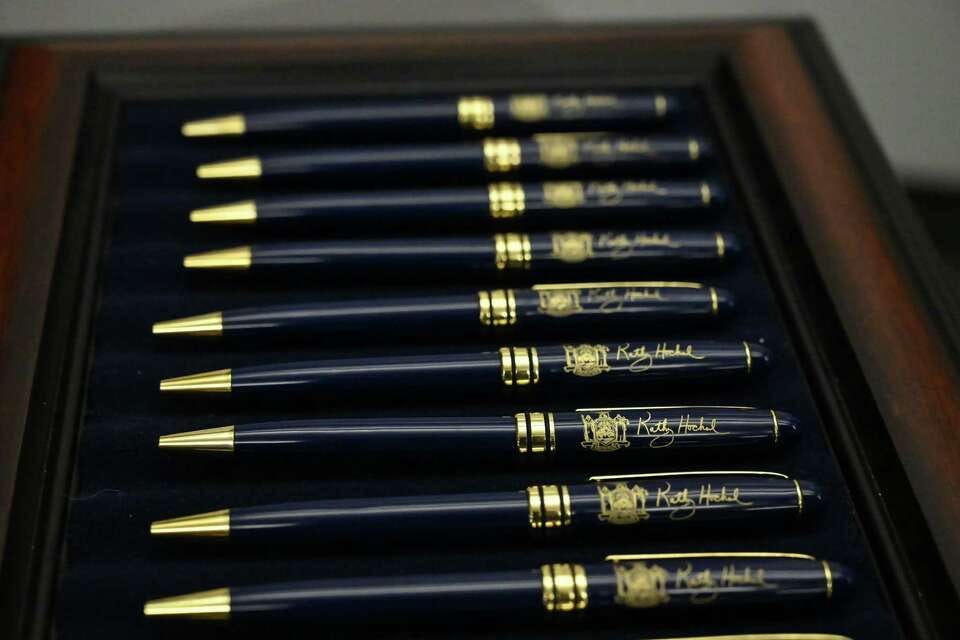10 bills Hochul still has to consider by the end of the year
That includes C02 fracking, felons on juries, short-term rental regulations and more.
Good afternoon — it’s Wednesday and National Jukebox Day.
In today’s CapCon:
There’s about a month left of the year and Hochul still has plenty of bills left to consider by January.
Here are 10 major or interesting bills to watch as they head to Hochul’s desk.
Hochul also signed a few more bills Tuesday, clearing her desk ahead of Thanksgiving.
❗ CapCon Note: Hey, all. I just wanted to give you a heads up that CapCon will be taking a brief break Thursday and Friday. I will be in a food coma and hope the same for you. CapCon will also be brief today case you’re traveling.
🖊️ 10 bills Hochul has to consider you might have forgotten about
Gov. Kathy Hochul has 201 bills left to consider before the end of the year. That’s a lot of bills but nothing the governor’s office can’t breeze through. Hochul considered nearly 150 in the past week and a half.
I know today’s a big travel day so I thought we would do something different and look at some of the big or interesting bills she has left to sign.
You’ll already know about some of these if you’re a regular CapCon reader but there might also be one or two you forgot about. I sure did.
These are not in any particular order and some will only need a line or two to explain. I’ll give you more context for others.
1. Contracts without comptroller oversight (S9171 | A10281)
It’s become increasingly common over the last decade for certain state contracts to be exempt from oversight by the state comptroller’s office. That office is otherwise able to audit those contracts and identify any discrepancies.
This would require that, when a contract is exempt from that oversight, the state publicly post a description of the contract, the vendors chosen, the services expected and the length of that commitment.
It would also require the state to include a statement explaining why or why not the contract went through a competitive bidding process before it was awarded.
2. Short-term rental regulations (S885C | A4130C)
Short-term rentals are when someone rents out their home, or part of it, to someone on a temporary basis. You would know them from services like Airbnb and Vrbo.
New York doesn’t have any statewide regulations on those rentals. New York City enacted stringent regulations in recent years that significantly reduced the number of those rentals in the five boroughs. That was to free up more housing.
This would require property owners who host space on those services to register with the state and share regular data on their properties, the frequency of guests and more. It would also require the rental services to submit data to the state.
Short-term rentals would be subject to the same taxes as hotels and motels under the bill.
3. Farm worker overtime tax credit (S9082 | A9824)
New York is phasing in a rule that will require farmers to pay their workers overtime after 40 hours worked instead of the current 56. The state has created a new tax credit that covers those new costs.
But not all farmers were able to take advantage of the tax credit this year because of how they manage their payroll. It turns out that, if a farmer uses a payroll or management entity to handle wages rather than handling it themselves, they weren’t eligible for the tax credit.
This would make those farmers also eligible to receive the tax credit.
4. Fracking with carbon dioxide (S8357 | A8866)
If you saw this one in yesterday’s CapCon, feel free to skip to the next bill.
New York has a ban on high-volume hydraulic fracturing, better known as fracking. That’s when water is forced into underground shale to break up that rock and extract trapped natural gas. Chemicals are also involved.
This would ban the same practice using carbon dioxide after a company in Binghamton proposed leasing land from residents in the area.
5. Personal information of jurors (S6239 | A7495)
The criminal trial of former President Donald J. Trump didn’t inspire this bill but it may have given it the votes to pass.
Defendants, including Trump, can often have access to the names and addresses of potential jurors. But some defendants are openly hostile toward jurors.
This would allow judges in New York to issue an order of protection preventing the disclosure of jurors’ names and addresses to a defendant.
Keep reading with a 7-day free trial
Subscribe to Capitol Confidential with Dan Clark to keep reading this post and get 7 days of free access to the full post archives.



